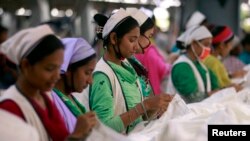Bangladesh has re-opened hundreds of garment factories, just days after closing them.
The Bangladesh Garment Manufacturers and Exporters Association called for the re-openings Friday.
The closings this week were prompted by worker protests over low pay and poor working conditions sparked by the country's worst industrial accident.
In response to workers' demands, the Bangladeshi government has approved labor law changes, making it easier for workers to form unions. The government also has set up a panel to consider garment worker salary raises.
A building housing several garment factories collapsed last month, killing more than 1,100 people and highlighting the garment industry's appalling safety conditions.
Pope Francis has described the garment workers' $38 monthly wage as "slave labor."
Bangladesh is the world's second largest apparel maker. The $20 billion industry accounts for up to 80 percent of annual exports.
The Bangladesh Garment Manufacturers and Exporters Association called for the re-openings Friday.
The closings this week were prompted by worker protests over low pay and poor working conditions sparked by the country's worst industrial accident.
In response to workers' demands, the Bangladeshi government has approved labor law changes, making it easier for workers to form unions. The government also has set up a panel to consider garment worker salary raises.
A building housing several garment factories collapsed last month, killing more than 1,100 people and highlighting the garment industry's appalling safety conditions.
Pope Francis has described the garment workers' $38 monthly wage as "slave labor."
Bangladesh is the world's second largest apparel maker. The $20 billion industry accounts for up to 80 percent of annual exports.






